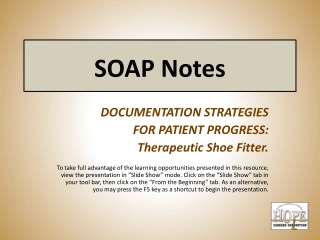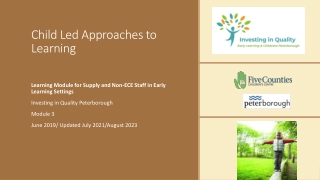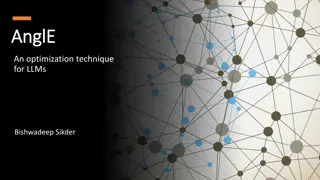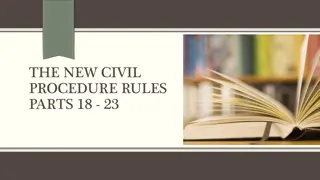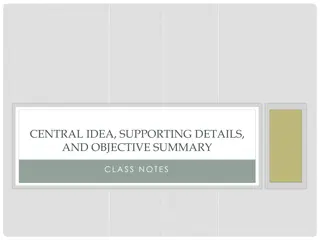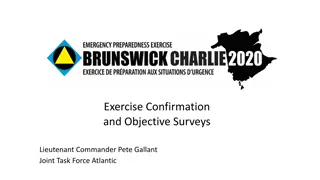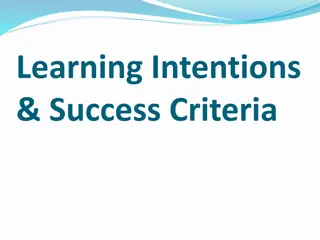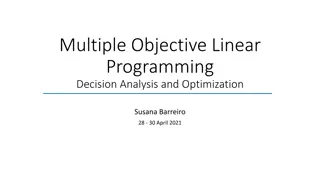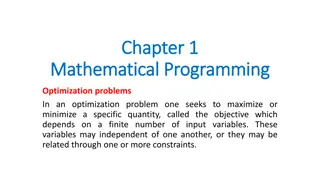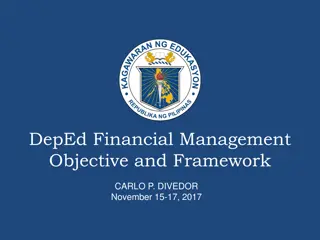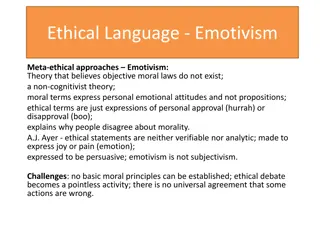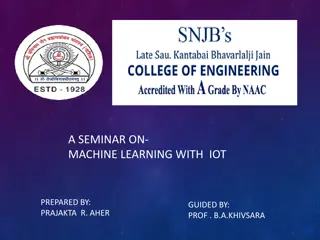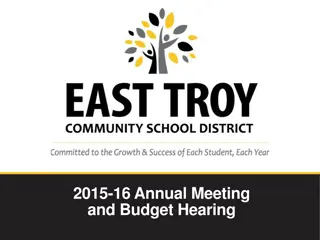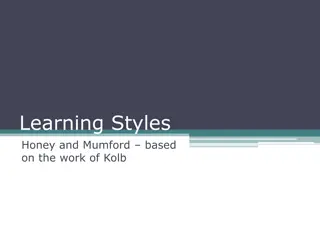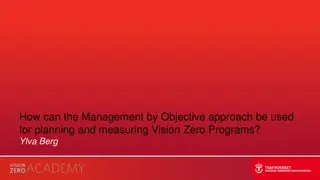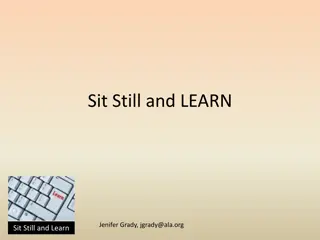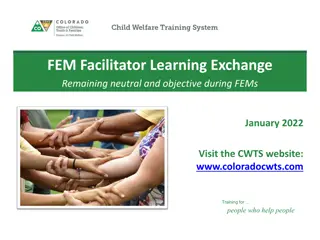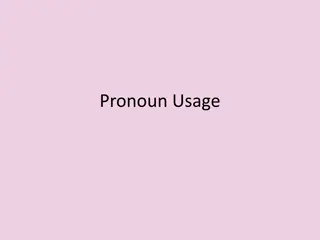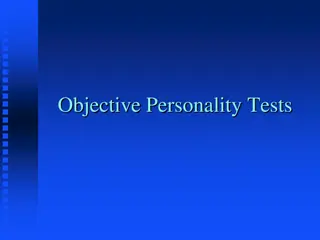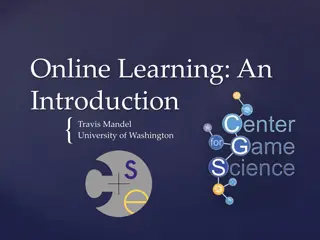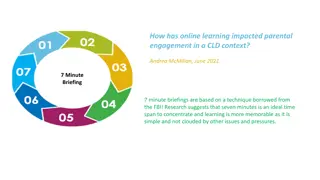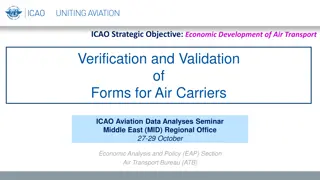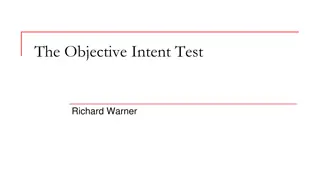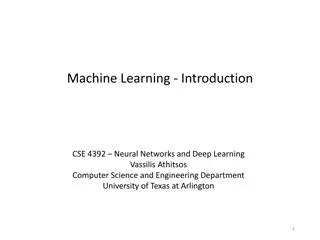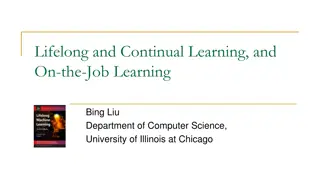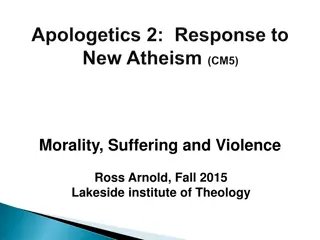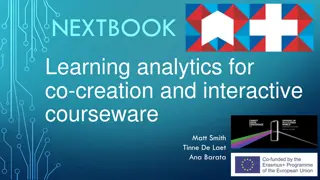Documentation Strategies for Patient Progress in SOAP Notes
Common format for SOAP Notes documentation includes Subjective, Objective, Assessment, and Plan sections. Subjective notes involve patient information and history, while Objective notes detail examination findings. Effective documentation strategies include organization, use of active verbs, and dir
2 views • 33 slides
Child-Led Approaches to Learning - Training Module Overview
In this training module series for supply and non-ECE staff in early learning settings, the emphasis is on child-led approaches to learning, exploring topics like how learning happens, responsive relationships, and child development. The objective is to enhance the skills of staff members and elevat
2 views • 30 slides
AnglE: An Optimization Technique for LLMs by Bishwadeep Sikder
The AnglE model introduces angle optimization to address common challenges like vanishing gradients and underutilization of supervised negatives in Large Language Models (LLMs). By enhancing the gradient and optimization processes, this novel approach improves text embedding learning effectiveness.
9 views • 33 slides
Understanding Civil Procedure Rules Parts 18-23
The new civil procedure rules cover various aspects such as counterclaims, additional claims, changes to parties, representative parties, miscellaneous rules, and rules regarding minors and patients. The overriding objective is to ensure cases are dealt with justly and at a proportionate cost, consi
1 views • 49 slides
Spring 2015 English 110 Final Exam Information
Spring 2015 English 110 Final Exam includes an Essay Final Exam to be completed by May 21st and an Objective Final Exam on May 27th or May 28th. The Essay Final consists of flash fiction tasks, literary criticisms, and analysis, while the Objective Final covers fiction elements identification and an
0 views • 7 slides
Objective Structured Clinical Examination (OSCE): A Modern Approach to Assessing Clinical Competence
The Objective Structured Clinical Examination (OSCE) is a modern examination method widely used in the field of health science to evaluate clinical skill performance. It involves stations where medical students interact with simulated patients to demonstrate competencies such as history taking, phys
1 views • 40 slides
Understanding Central Idea and Objective Summary in Text Analysis
Determining the central idea involves deciphering the author's main point about a topic, while analyzing its development delves into how supporting ideas are interconnected. Providing an objective summary requires highlighting key details succinctly, excluding personal opinions. The process entails
0 views • 6 slides
Exercise Confirmation and Objective Surveys by Lieutenant Commander Pete Gallant
Lieutenant Commander Pete Gallant from Joint Task Force Atlantic is organizing Exercise Confirmation and Objective Surveys. The questionnaire and confirmation of participation are crucial in guiding the exercise development to meet objectives. Contact information, objectives, level of play details,
0 views • 9 slides
Understanding Learning Intentions and Success Criteria
Learning intentions and success criteria play a crucial role in enhancing student focus, motivation, and responsibility for their learning. Research indicates that students benefit greatly from having clear learning objectives and criteria for success. Effective learning intentions should identify w
1 views • 24 slides
Multiple Objective Linear Programming: Decision Analysis and Optimization
Explore the complexities of multiple objective linear programming, decision-making with multiple objectives, goal programming, and evolutionary multi-objective optimization. Discover the trade-offs and conflicts between various objectives in optimization problems.
6 views • 84 slides
Experiential Learning Portfolio Program at Barry University
Experiential Learning Portfolio Program at Barry University's School of Professional and Career Education (PACE) offers a unique opportunity to earn college credit for learning gained from work and community service experiences. Through this program, students can showcase their experiential learning
0 views • 16 slides
Introduction to Mathematical Programming and Optimization Problems
In optimization problems, one aims to maximize or minimize an objective based on input variables subject to constraints. This involves mathematical programming where functions and relationships define the objective and constraints. Linear, integer, and quadratic programs represent different types of
0 views • 25 slides
DepEd Financial Management Objective and Framework Overview
The DepEd Financial Management Objective and Framework (FMOM) serves as a crucial tool for implementing good governance, transparency, and accountability in managing financial resources within the Department of Education. It outlines guidelines for improving efficiency and effectiveness in the alloc
0 views • 23 slides
Understanding Emotivism in Ethical Philosophy
Emotivism is a meta-ethical theory that rejects objective moral laws, instead positing that moral terms express personal emotional attitudes, not universal truths. Influenced by A.J. Ayer and rejecting naturalism, this theory suggests that ethical statements are not objective propositions but rather
0 views • 28 slides
Understanding Optimization Techniques for Design Problems
Explore the basic components of optimization problems, such as objective functions, constraints, and global vs. local optima. Learn about single vs. multiple objective functions and constrained vs. unconstrained optimization problems. Dive into the statement of optimization problems and the concept
0 views • 96 slides
Seminar on Machine Learning with IoT Explained
Explore the intersection of Machine Learning and Internet of Things (IoT) in this informative seminar. Discover the principles, advantages, and applications of Machine Learning algorithms in the context of IoT technology. Learn about the evolution of Machine Learning, the concept of Internet of Thin
0 views • 21 slides
Crafting an Effective Resume for Job Applications
A well-crafted resume is essential in making a positive first impression on potential employers. It should showcase key skills, be well-organized, and free of errors. Include crucial elements like contact information, career objective, education, work experience, skills, activities, and references.
0 views • 21 slides
Innovative Learning Management System - LAMS at Belgrade Metropolitan University
Belgrade Metropolitan University (BMU) utilizes the Learning Activity Management System (LAMS) to enhance the learning process by integrating learning objects with various activities. This system allows for complex learning processes, mixing learning objects with LAMS activities effectively. The pro
4 views • 16 slides
District of Choice Annual Meeting and Vision Statement
Annual meeting and budget hearing for the 2015-16 fiscal year highlighted key agenda items such as election of temporary chairperson, treasurer's report, budget presentation, and resolutions on tax levy and salaries. Recognitions were given for voluntary service to education, emphasizing commitment
0 views • 48 slides
Understanding Learning Styles: Honey and Mumford Based on Kolb's Work
Explore the four learning styles proposed by Honey and Mumford, which are based on the work of Kolb. The four styles are Activists, Reflectors, Theorists, and Pragmatists. Each style is characterized by unique traits and preferences for learning methods. Activists thrive on new experiences and chall
0 views • 10 slides
Utilizing Management by Objective Approach for Vision Zero Program Planning
The Management by Objective approach can aid in breaking down Vision Zero goals into achievable short-term objectives. This approach involves setting targets, monitoring progress, and aligning stakeholders towards creating a safe system for road users. By implementing performance indicators and targ
0 views • 8 slides
Unlocking the Power of Online Learning with Jenifer Grady
Explore the transformative nature of learning through online platforms with insights from Jenifer Grady. Understand the essence of learning, reasons behind learning, accessibility, and the concept of online learning. Discover how learning can be achieved anywhere, anytime, and delve into the world o
0 views • 26 slides
Adherence to 2008 Physical Activity Guidelines & Mortality Study
This study explores the association between adherence to the 2008 Physical Activity Guidelines for Americans and all-cause mortality. It analyzes data from the NHIS and NDI to assess the risks associated with aerobic and muscle-strengthening activities. The primary objective is to evaluate mortality
0 views • 29 slides
Metaheuristics and Hybrid Approaches in Multi-Objective Optimization
Multi-objective optimization involves solving complex problems with conflicting objectives, such as minimizing makespan and tardiness in flow shop scheduling. Pareto Optimal Solutions are sought, where improving one objective cannot be done without worsening another. Metaheuristics like S and P meth
0 views • 11 slides
FEM Facilitator Learning Exchange January 2022 Visit Summary
The FEM Facilitator Learning Exchange held in January 2022 focused on remaining neutral and objective during Family Engagement Meetings (FEMs). Facilitated by Colleen Gibley-Reed and Derek Dzien, the session emphasized community agreements, learning agendas, and topics for upcoming sessions. Partici
0 views • 12 slides
Understanding Pronoun Case: Nominative and Objective Pronouns
We have covered all pronouns in the slide show but still need to discuss pronoun case. Personal pronouns have nominative and objective cases. Nominative pronouns like "I" are used as subjects, while objective pronouns like "me" are used as objects. Learn how to use them correctly in sentences with e
0 views • 11 slides
Calibration of Multi-Variable Rainfall-Runoff Model Using Snow Data in Alpine Catchments
Explore the calibration of a conceptual rainfall-runoff model in Alpine catchments, focusing on the importance of incorporating snow data. The study assesses the benefits of using multi-objective approaches and additional datasets for model performance. Various aspects such as snow cover, groundwate
0 views • 16 slides
Understanding Objective Personality Tests and Traits
Explore various objective personality tests and traits, including examples of uni-dimensional traits such as Locus of Control, Type A/B personalities, Tolerance for Ambiguity, Need for Cognition, Bem Sex-Role Inventory, and more. Delve into the concepts introduced by psychologists like Julian Rotter
0 views • 14 slides
Understanding Key Concepts of Insurance
Key notions of insurance include fortuitous loss, risk occurrence, loss exposure, objective and subjective risk, and the law of large numbers to predict future loss experience. Objective risk is based on actual loss variation, while subjective risk is based on individual perception. Understanding th
0 views • 26 slides
Understanding Online Learning in Machine Learning
Explore the world of online learning in machine learning through topics like supervised learning, unsupervised learning, and more. Dive into concepts such as active learning, reinforcement learning, and the challenges of changing data distributions over time.
0 views • 49 slides
Impact of Online Learning on Parental Engagement in CLD Context
The global pandemic in 2020 led to the closure of schools, shifting learning to online platforms. This study explores how online learning has affected parental engagement in Culturally and Linguistically Diverse (CLD) contexts. Family Learning, distinct from homeschooling, plays a crucial role in en
0 views • 11 slides
ICAO Strategic Objective: Economic Development of Air Transport Verification and Validation Overview
This content provides an in-depth analysis of the ICAO Strategic Objective focusing on the economic development of air transport through verification and validation processes for air carriers. It includes details on forms verification, economic analysis, and policy considerations discussed at the IC
0 views • 22 slides
Understanding the Objective Intent Test in Contract Law
This content explores the concept of the objective intent test in contract law through legal cases and non-legal examples. It discusses promises, misunderstandings in non-legal situations, and the legal rule surrounding interpreting words and actions as a promise. The analysis of whether a question
0 views • 31 slides
Exploring The Good Life: Hedonism, Desire Theory, and Objective List Theory
Delve into the concepts of Hedonism, Desire Theory, and Objective List Theory to understand what constitutes a good life and the pursuit of well-being. Explore different value theories, the debate between subjective and objective values, and the philosophical perspectives on happiness and pleasure.
0 views • 60 slides
Understanding the Differences Between Objective and Projective Tests
Objective tests aim to maximize objectivity by providing structured response options, while projective tests delve into hidden emotions and conflicts through ambiguous stimuli. Pros of objective tests include standardization and reliability, but projective tests offer unique insights based on indivi
0 views • 10 slides
Understanding Machine Learning: Types and Examples
Machine learning, as defined by Tom M. Mitchell, involves computers learning and improving from experience with respect to specific tasks and performance measures. There are various types of machine learning, including supervised learning, unsupervised learning, and reinforcement learning. Supervise
0 views • 40 slides
Lifelong and Continual Learning in Machine Learning
Classic machine learning has limitations such as isolated single-task learning and closed-world assumptions. Lifelong machine learning aims to overcome these limitations by enabling models to continuously learn and adapt to new data. This is crucial for dynamic environments like chatbots and self-dr
0 views • 32 slides
The Debate on Objective Morality: The Atheistic Perspective
The discussion delves into the concept of objective morality and its relation to religious beliefs and atheism. It explores why most people believe in objective morality even though atheists argue against its existence based on evolutionary theories. The argument is centered on the existence of a hi
0 views • 13 slides
Enhancing Learning Through Co-Created Interactive Courseware and Learning Analytics
Explore the innovative concept of co-creation in interactive courseware and learning analytics to improve student learning outcomes. Discover how students collaborate in a social learning environment, track their progress, and engage in dialogic and constructive pedagogical strategies. Harness the p
0 views • 19 slides
